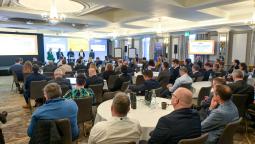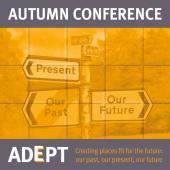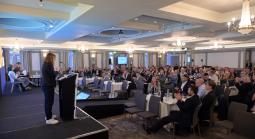Reflections on the ADEPT Autumn Conference: Creating Places Fit for the Future
The ADEPT Autumn Conference took place at the end of November – here are some reflections from the event from Ann Carruthers, President of ADEPT.
As I stood before my fellow place directors in Bristol, I was struck by the incredible resilience and passion that defines local government in these challenging times. Our conference theme, 'Creating Places Fit for the Future', couldn't have been more apt as we confronted the complex challenges facing our communities.
From the moment we gathered, it was clear that we're not just managing services: we are building civilised societies. The scale of our challenges is immense, with constrained budgets, climate change, social inequality and mounting expectations. Yet, our discussions were marked by hope, innovation and a profound commitment to making a difference.
Our first plenary on future proofing local government set the tone brilliantly. We didn't shy away from the hard conversations about financial constraints and technological transformation. The potential of artificial intelligence and data-driven decision-making is enormous, but we're equally aware of the implementation challenges. What resonated most was our collective understanding that collaboration is key – across authorities, sectors, and communities.
The nature markets session was particularly fascinating. Are they the silver bullet for environmental investment? Emphatically, no. But they are a crucial part of our toolkit. We heard stark projections about global temperature rises and the £2-5 billion funding gap in nature recovery. The Environment Bank's success in restoring 700 hectares of degraded land through private funding offered a glimmer of hope, demonstrating how we can attract investment in biodiversity.
Bill Esterson MP’s address added valuable context, particularly around energy initiatives and the need for inclusive approaches to net-zero technologies. His emphasis on ensuring that everyone can benefit from green innovations, not just those who can afford them, was particularly powerful.
Plenary 3, ‘Housing fit for the future’ emerged as another critical theme. With 8.5 million people on social housing waiting lists, our target of 1.5 million new homes in five years is more than a numerical challenge. It's about enhancing quality of life, integrating public health into urban design, and creating truly liveable communities.
Perhaps the most inspiring session took place on day two, which looked at how to ensure young people’s voices are represented and heard in placemaking. The statistic is sobering: 80% of 18-34-year-olds have never participated in local planning consultations. We explored innovative solutions – virtual consultations, educational workshops, and partnerships that genuinely engage young people. The Bristol City Youth Council representatives were remarkable, highlighting issues like community safety with such passion and insight. They were truly inspirational.
A memorable quote from our Mentimeter board captured the ethos perfectly: "We don't inherit our places from our grandparents, we borrow them from our children."
The presentation on the PACE Programme was another highlight, brilliantly described as a 'Star Wars saga' of placemaking. We discussed the importance of storytelling, community engagement and the delicate balance between top-down and grassroots approaches to local governance.
Throughout the conference, several key themes emerged. We need long-term strategic thinking. We must embed conversations about nature and sustainability into everything we do. Collaboration across political and organisational boundaries isn't just desirable – it's essential.
As I reflected in my closing speech, I'm hopeful. Despite the challenges, we are making a difference. Our role as place directors is about more than managing services; we're actively laying the foundations of a civilised society.
My challenge to everyone was simple: be good ancestors. The decisions we make today will shape the communities of tomorrow. Each connection made, each innovative idea shared, each collaborative effort is a step towards creating places that work for everyone.
At the outset of the conference, I posed everyone with a challenge: to take away one thing they would consider, trial or action back at base. Having listened to the discussions, I came up with five possible actions, but in the interests of realism, narrowed my commitment down to seeking to establish a youth placemaking forum and working to ensure we have young people directly involved in our work.
To all my fellow place directors: we're doing stuff that matters. In the words of startup leader Siqi Chen, "Life is short. Do stuff that matters." And that's exactly what we're doing.



